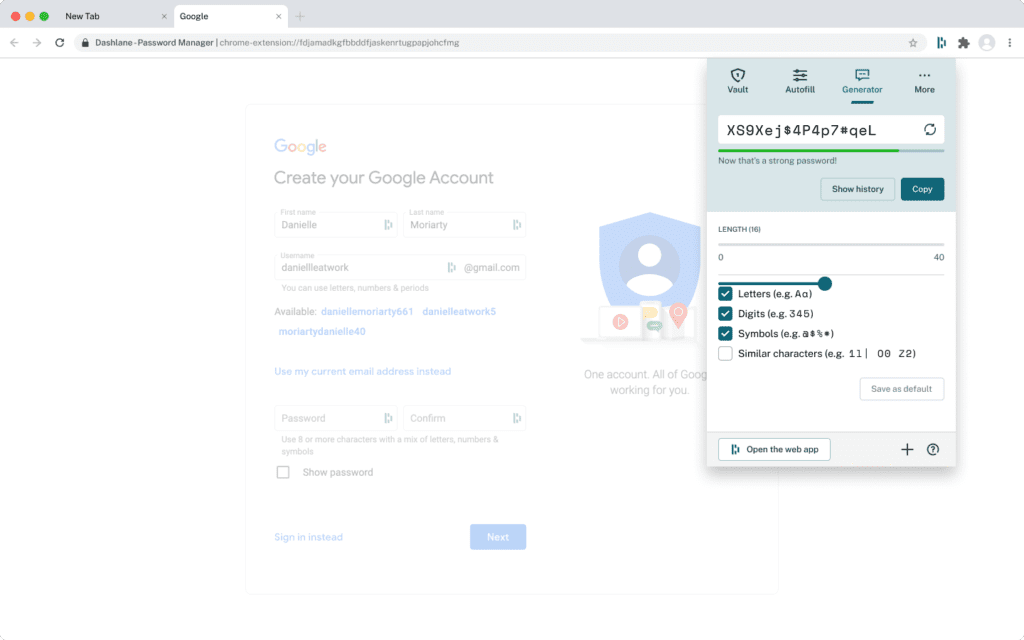Understanding Your Dashlane Password Health Score

We've all got a lot of passwords to keep track of, and many of us fall into the trap of “reset it and forget it.” But in order to prevent data breaches and hacks to your accounts, it’s vital to keep an eye on those passwords and know if they are weak, compromised, or reused. With the average person having 240 accounts, no one has time to manually check all of their passwords for vulnerabilities. Luckily, Dashlane's Password Health Score tool makes it easy to keep a close eye on your logins and protect your digital identity.
The best way to prevent hacks and ensure that only you have access to your private data is to create complex, unique passwords for each account and to change passwords that are compromised in a breach or hack immediately. Dashlane provides you with insights and tools to easily improve your Password Health Score and secure your accounts.
Want to see how your passwords stack up? Check out your Password Health Score, or sign up for a Dashlane account so you or your organization can access this tool.
What is password health?
Password health refers to the level of password security of any given user or group of individuals within an organization. Our Password Health Score tool uses a unique combination of metrics to determine the password health of users using Dashlane to store passwords. Within the Password Health tool, you’ll see which passwords need to be updated immediately and get recommendations to instantly improve your Password Health Score.

How does it work?
When any of your accounts are deemed at risk, Dashlane identifies which critical accounts you should secure first. These critical accounts—like those for banking, email, and social media—are most likely to be targeted by bad actors and should always be your top priority. Your Password Health Score will increase when you update any of your weak, reused, or compromised passwords but will be most affected by the status of the passwords that protect your critical accounts. So be sure to change those first.
Why does it matter?
Your password health matters because passwords are often the weakest link in an individual’s or organization’s cybersecurity. Cybercriminals buy and sell leaked personal data and passwords on the dark web. With advances in password-cracking software, cybercriminals are able to use your username and password combinations across the web.
They can also attempt to hack your other accounts by using combinations of similar passwords. So the next time you say, “I don’t reuse passwords!” but your passwords are Metallica82, Metallica1982, and Metallica1982!, remember that software can easily identify those similar passwords. Dashlane’s algorithm also identifies similar passwords and prompts you to change them immediately to stay one step ahead of these potential threats.
- If any passwords are similar, they will be grouped together under the Reused tab in the Password Health section of your app.
- If a password becomes compromised and you reuse similar passwords for other accounts, those will also be grouped together with the compromised password under the Compromised tab in your Password Health screen.
Get personalized tips like this and more. Check out Dashlane for free.
What does my Password Health Score measure?
You no longer need to guess how strong your passwords are. Our Password Health Score algorithm works silently in the background, but understanding exactly how our algorithm evaluates your passwords can help you improve your password health and prevent future password offenses.
Compromised: A compromised password is one that is connected to a service or product that was recently breached, thus rendering your password (no matter how strong) unsafe. Passwords that are compromised in a breach should be changed immediately and never used again.
Reused: A reused password is one that is the same or similar to a password from a different account. Reusing passwords is a bad habit because if one account gets breached, all your accounts with that reused password become vulnerable. You should always use a password generator to create unique, complex passwords for all of your accounts.
Weak: A weak password is one that is easily guessable (in other words, some combination of your name, address, date of birth, sports team, pet name, and so on) or simple (for example, 12345 or password). These passwords are easily cracked with software and often land on the most popular password lists.
Excluded: An excluded password is one that you’ve told the algorithm to ignore. This could be a password that has been shared with you (that you don’t control), or it could be the password to a physical thing (for example, your phone or WiFi passcode) that you decided to store in your vault. Either way, once you exclude a password, it will no longer be counted against your Password Health Score and will remain under the Excluded tab until instructed otherwise.
Pro Tip: the simplest way to avoid having passwords fall under any of these categories is to generate unique, complex passwords for each of your accounts using the Password Generator built into our apps, our extension, and our website.

What else can I do to improve my online security?
Creating strong, unique passwords and securely storing them will add necessary roadblocks that prevent cybercriminals from easily accessing your logins. But you can also take additional steps to elevate your digital security, and Dashlane makes it simple.
- Use a VPN for WiFi protection. Using a VPN can help keep your data protected and private while browsing the web on public WiFi. Dashlane Premium and Dashlane Friends & Family plans come with Hotspot Shield VPN, which comes with great features and support.
- Turn on 2-factor authentication (2FA). Add a layer of security to your online accounts by requiring a unique token or push notification to verify your identity when you log in. Dashlane makes 2FA easy with our Authenticator tool and a standalone app.
- Mitigate risk with Dark Web Monitoring. Monitoring the dark web in real time for leaked logins will help you stop hacks in their tracks. If a password is compromised, you can change it and render it useless before anyone has a chance to try it. Dark Web Monitoring is available on all paid Dashlane plans.
While these additional security steps won’t increase your Password Health Score, they will improve your cybersecurity health overall, so you can consider them extra credit—your future self will thank you.
By harnessing the power of your Password Health Score, enabling 2FA, and keeping an eye on the dark web, you’re well on your way to strengthening your accounts and protecting your digital identity.
Check your Password Health Score and improve it with Dashlane today.
This feature is included in all Dashlane plans. Still not sure if Dashlane is right for your business? Try it for free.
Sign up to receive news and updates about Dashlane
